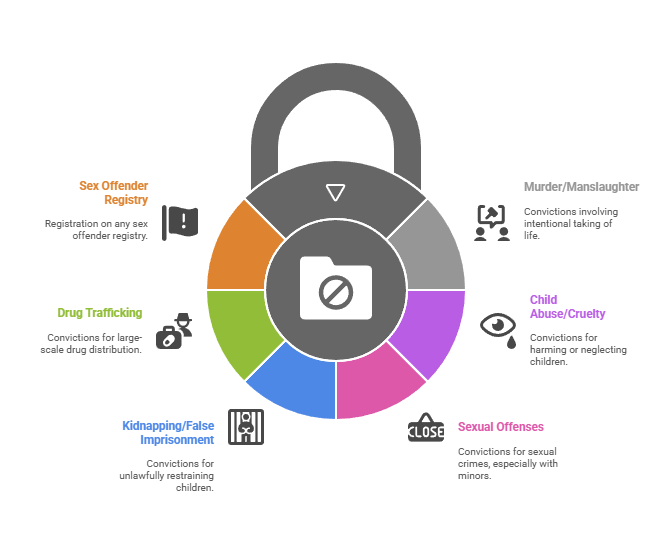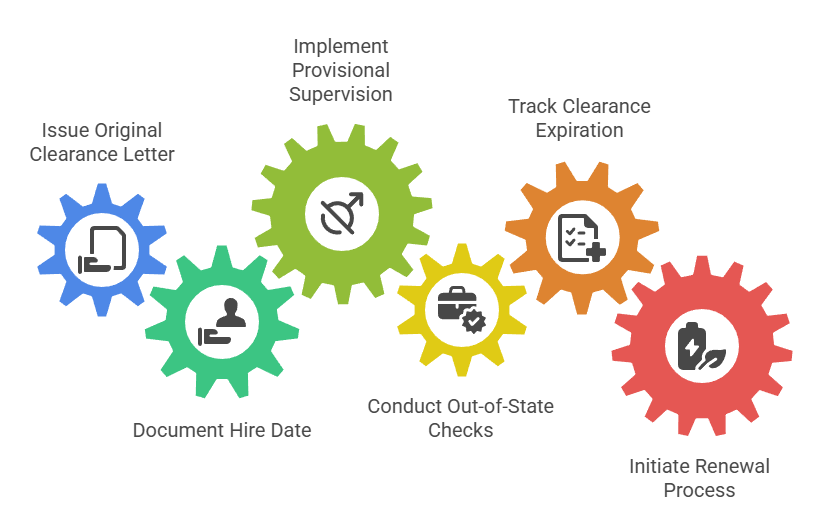Georgia's daycare background check system operates through the Background Check via Fingerprinting Technology System (BFTS). All childcare employees and volunteers must undergo comprehensive criminal history screenings through both FBI and Georgia Crime Information Center databases before working with children. Navigating the Georgia Department of Human Services (DHS) requirements, CAPS (Childcare and Parent Services) compliance standards, and multi-tiered approval processes demands precise understanding of registration procedures, disqualifying offenses, and ongoing monitoring obligations.
Key Takeaways
- All Georgia daycare employees, including directors, teachers, substitutes, and volunteers with unsupervised child access must complete BFTS fingerprint-based background checks before their start date.
- The Georgia DHS background check process typically takes 3-7 business days for provisional clearance and up to 30 days for comprehensive clearance, requiring advance planning for staffing needs.
- Background checks cost $57.25 per applicant ($25 for FBI processing and $32.25 for state processing), with facilities responsible for determining payment responsibility.
- Disqualifying offenses include any felony involving child abuse, sexual offenses, violent crimes, and specific drug-related convictions within statutory timeframes established by Georgia law.
- BFTS registration requires facilities to maintain active accounts, sponsor individual applicants, and track clearance statuses through the online portal system.
- Out-of-state applicants need additional background checks from states where they've resided in the past five years, creating extended timelines for workforce onboarding.
- Comprehensive records management systems ensure facilities maintain documentation of all background checks, clearance letters, and renewal dates for licensing inspections.
- CAPS provider compliance demands synchronized background check processes with licensing requirements, impacting subsidy payment eligibility and operational authorization.
Understanding Georgia's Daycare Background Check Requirements
Georgia childcare facilities operate under strict personnel screening regulations established by the Department of Human Services Division of Family and Children Services (DFCS). These requirements apply universally across center-based programs, family childcare learning homes, and group daycare facilities throughout the state. The regulatory framework protects children by ensuring comprehensive vetting of all individuals with child access.
The Background Check via Fingerprinting Technology System (BFTS) serves as Georgia's centralized platform for processing childcare workforce screenings. This system replaced previous methods in 2013, creating standardized procedures that integrate FBI criminal history records with Georgia Crime Information Center (GCIC) databases. Facilities must understand that BFTS registration and ongoing management represent non-negotiable operational requirements rather than optional administrative tasks.
Georgia law mandates background checks for specific personnel categories based on their access to children and facility responsibilities. Staff members requiring clearance include center directors, lead teachers, assistant teachers, substitute staff, transportation providers, food service workers with child contact, volunteers, and household members in family childcare settings. The regulations eliminate exemptions based on employment duration or limited contact hours.
Who Needs a Georgia Childcare Background Check?

Employees Requiring Background Checks
Every individual working in licensed childcare facilities must complete the Georgia DHS background check childcare process before beginning employment duties. This includes administrative directors who manage facility operations, classroom teachers providing direct instruction, and assistant teachers supporting educational activities. Floater staff covering multiple rooms, maintenance personnel entering childcare spaces, and kitchen staff with potential child interaction also require clearance.
Substitute teachers present particular compliance challenges since facilities often need rapid staffing solutions. Georgia regulations require completed background checks before substitutes work independently with children, though provisional clearance options provide limited flexibility. Many successful facilities maintain pre-cleared substitute pools by completing background screenings before immediate needs arise. This approach ensures continuous compliance during staffing emergencies.
Volunteers and Non-Employee Requirements
Volunteer background check requirements depend on supervision levels and access duration. Individuals with unsupervised access to children—including field trip chaperones, classroom helpers, or regular program volunteers—must complete full background checks through BFTS. Parents volunteering under continuous staff supervision for limited activities may receive exemptions. However, facilities should document supervision protocols to demonstrate compliance during licensing inspections.
Family childcare learning homes face additional requirements for household members aged 17 and older. All residents in homes providing childcare services must undergo background checks regardless of their involvement in childcare operations. This household member screening protects children from potential exposure to individuals with disqualifying criminal histories who share the childcare environment.
Ownership and Governance Roles
Board members and facility owners typically require background checks when they maintain regular facility presence or unsupervised child access. Ownership or governance roles without direct child contact may not trigger screening requirements. Nevertheless, facilities should consult licensing specialists when unclear about specific situations. Conservative compliance approaches that conduct background checks for all individuals with facility access provide maximum protection against regulatory violations.
The Georgia BFTS Background Check Process
BFTS System Registration and Account Setup
Childcare facilities must establish organizational accounts within the BFTS system before sponsoring individual employee background checks. The registration process begins at the BFTS website where facility administrators create accounts using their childcare learning center license numbers, family childcare learning home permit numbers, or group daycare home approval documentation. Account creation requires accurate facility information including legal business names, physical addresses, licensing identifiers, and authorized administrator contact details. Facilities designate BFTS administrators who manage background check sponsorships and monitor clearance statuses.
These administrators receive unique login credentials providing access to facility-specific dashboards. Through these dashboards, they initiate employee screenings, track application progress, and download clearance documentation. Larger organizations often designate multiple administrators to ensure continuous system access despite staff absences or turnover.
Fingerprinting Appointment and Application Process
Individual applicants complete background checks through multi-step processes beginning with facility sponsorship. BFTS administrators initiate applications by entering employee information into the system, which generates unique applicant identification numbers and authorization codes. Employees receive email notifications containing instructions, identification numbers, and links to complete personal information sections. Consequently, applicants must then schedule fingerprinting appointments at approved Fieldprint locations throughout Georgia.
The Fieldprint network operates fingerprinting centers in major metropolitan areas and regional population centers. Rural applicants may face travel requirements to reach the nearest locations. Scheduling systems allow applicants to select convenient appointment times, typically offering same-day or next-day availability in most service areas.
During fingerprinting appointments, applicants present government-issued photo identification, their BFTS authorization codes, and payment for processing fees. Acceptable identification includes driver's licenses, state identification cards, passports, or military identification cards. The fingerprinting process takes approximately 15 minutes. Technicians capture electronic fingerprint images that are transmitted directly to FBI and GCIC databases for criminal history searches.
Processing Timelines and Clearance Types
Georgia issues provisional clearance letters when initial database searches return no disqualifying offenses. This allows employees to begin work under supervision while comprehensive reviews continue. Provisional clearance provides operational flexibility but requires facilities to maintain enhanced supervision protocols. Some counties or licensing specialists may restrict provisional clearance usage, so facilities should verify local policies.
Comprehensive clearance represents final authorization after complete FBI and state database reviews. These clearances remain valid for five years from issue dates. After this period, employees must complete renewal background checks. Facilities must track clearance expiration dates systematically, initiating renewal processes 60-90 days before expirations to prevent employment interruptions.
| Clearance Type | Processing Timeline | Authorization Level |
| Provisional Clearance | 3-7 business days | Limited authorization pending comprehensive review |
| Comprehensive Clearance | 15-30 business days | Full authorization for ongoing employment |
| Exception Review | 30-60 business days | Case-by-case evaluation for specific criminal histories |
Exception reviews occur when background checks reveal criminal histories requiring individualized assessments. The Department of Human Services evaluates offense nature, occurrence timing, rehabilitation evidence, and risk assessments. This process determines employment eligibility and often extends timelines significantly.
Georgia Daycare Fingerprint Requirements and Procedures
Georgia regulations mandate fingerprint-based background checks rather than name-based searches to ensure accurate criminal history identification. Fingerprinting technology eliminates identity confusion that occurs with common names. This prevents false positives while capturing accurate offense records across jurisdictions and name variations. The FBI's Integrated Automated Fingerprint Identification System (IAFIS) compares submitted fingerprints against criminal databases containing over 70 million records.
Digital fingerprinting methods used at Fieldprint locations provide superior image quality compared to traditional ink methods. The electronic capture systems verify print quality before transmission, reducing rejection rates that delay processing. Applicants with challenging fingerprints due to age, occupation-related wear, or medical conditions may require multiple capture attempts. However, technicians provide immediate feedback about image quality.
Payment structures for Georgia daycare fingerprint requirements include separate fees for state and federal processing. The current total cost of $57.25 breaks down to $32.25 for Georgia state processing and $25.00 for FBI processing. Facilities determine payment responsibility, with some organizations covering costs as employment benefits while others require applicant payment. Payment methods at fingerprinting locations typically include credit cards, debit cards, and money orders, though cash acceptance varies by location.
Disqualifying Offenses and Criminal History Barriers
Automatic Disqualifications
Georgia law establishes specific criminal offenses that permanently bar individuals from childcare employment. These offenses create absolute barriers regardless of how much time has passed or what rehabilitation efforts an applicant has completed. Understanding these permanent disqualifications helps facilities screen candidates effectively and prevents wasted time processing applications that will inevitably result in denials.

- Murder or voluntary manslaughter convictions: Any conviction involving intentionally taking another person's life creates a permanent employment bar.
- Child abuse or cruelty to children offenses: Convictions for physically harming, neglecting, or exploiting children eliminate any possibility of childcare employment.
- Sexual offenses including rape or child molestation: Any sexual crime conviction, particularly those involving minors, results in immediate and permanent disqualification.
- Kidnapping or false imprisonment involving minors: Convictions for unlawfully restraining or taking children create permanent barriers to childcare work.
- Felony drug trafficking convictions: Large-scale drug distribution offenses permanently bar individuals from working with children.
- Sexual offender registry listings: Registration on any sex offender registry, regardless of jurisdiction, creates automatic disqualification from Georgia childcare employment.
Child-related offenses receive particular scrutiny within Georgia's childcare screening framework. Convictions for contributing to the delinquency of minors, endangering children, or violating child pornography laws create permanent employment bars. Violent crime convictions including aggravated assault, armed robbery, or felony domestic violence offenses typically result in disqualification as well.
Time-Limited Disqualifications and Exception Reviews
Certain offenses create temporary disqualification periods allowing eventual employment eligibility after specified timeframes. Drug possession convictions may permit employment after five years from conviction or sentence completion, whichever occurs later. Property crimes including theft or fraud convictions often allow exception reviews. These reviews evaluate rehabilitation evidence, employment history stability, and offense circumstances.
The exception review process requires applicants to submit supporting documentation demonstrating rehabilitation. Acceptable evidence includes completion certificates from drug treatment programs and letters from probation officers confirming successful supervision completion. Stable employment records following convictions and character references from community leaders also strengthen applications. The Department of Human Services weighs public safety concerns against workforce needs and individual rehabilitation when making exception determinations.
Facilities cannot employ individuals awaiting exception review decisions without specific DHS authorization. The waiting period creates workforce planning challenges, particularly in competitive labor markets where delayed hiring decisions result in candidate losses. Therefore, transparent communication with applicants about potential disqualifications and realistic timeline expectations helps manage these situations effectively.
CAPS Compliance and Background Check Requirements
The Childcare and Parent Services (CAPS) program provides subsidized childcare assistance to eligible Georgia families. Facilities participating as CAPS providers face enhanced compliance requirements beyond basic licensing standards. Background check compliance represents a critical CAPS participation requirement. Violations can potentially result in subsidy payment suspensions or permanent program removal.
CAPS regulations require providers to maintain current background checks for all staff members, with no grace periods for expired clearances. The five-year renewal requirement demands systematic tracking systems ensuring timely resubmission before expiration dates. Facilities receiving CAPS payments must demonstrate during quality rating reviews and compliance monitoring visits that all personnel files contain valid, unexpired clearance letters. Enhanced documentation requirements apply to CAPS providers compared to non-participating facilities.
Providers must maintain organized personnel files containing original clearance letters, renewal tracking logs, and documentation of supervision protocols during provisional clearance periods. These records face review during annual monitoring visits, quality rating assessments, and investigation processes following incident reports or complaints. Consequently, CAPS providers should implement robust record-keeping systems that exceed minimum licensing requirements to maintain program participation eligibility.
Out-of-State Background Checks and Multi-State Requirements
Five-Year Residency History Requirements
Georgia requires applicants who lived in other states during the past five years to obtain additional background checks from those jurisdictions. This multi-state requirement recognizes that Georgia databases only capture in-state criminal activity, creating potential screening gaps for recent arrivals. Facilities hiring employees from other states must collect documentation proving out-of-state background check completion before employment begins.
Each state maintains unique background check processes, creating complexity for multi-state clearance requirements. Some states offer name-based searches through state police agencies, while others require fingerprint-based FBI checks similar to Georgia's system. Processing timelines vary dramatically across jurisdictions, ranging from 48-hour turnarounds in some states to 6-8 week waits in others. Facilities should require out-of-state applicants to initiate multi-state background checks immediately upon receiving conditional employment offers.
Military and Federal Employment Histories
Applicants with military service or federal employment histories present unique verification challenges. Military bases and federal facilities maintain separate criminal justice systems not always captured in state databases. Therefore, Georgia DHS may require additional documentation from military or federal employers confirming no disqualifying offenses occurred during service periods.
FBI fingerprint checks capture federal offenses, providing some coverage for applicants with federal backgrounds. However, military court-martial proceedings or non-judicial punishments may not appear in standard criminal databases. Facilities should request discharge documentation and service records from military applicants to verify honorable service completion without disqualifying incidents. Documentation of good-faith efforts to obtain out-of-state and specialized background checks protects facilities during licensing reviews.
Maintaining Compliance and Record Management
Personnel File Documentation Requirements
Comprehensive personnel files form the foundation of background check compliance. Each employee file must contain specific documentation demonstrating that facilities have met all screening requirements before allowing staff to work with children. Georgia licensing specialists conduct thorough personnel file reviews during inspections, and incomplete documentation triggers compliance violations that can delay licensing approvals or result in corrective action plans.

- Original BFTS clearance letter: The official clearance document issued by Georgia DHS proving completed background check.
- Hire date documentation: Records showing the employment start date occurred after clearance receipt, not before.
- Provisional clearance supervision proof: Documentation of enhanced supervision protocols when employees began work under provisional clearance.
- Out-of-state background checks: Copies of background check results from all states where employees lived during the past five years.
- Clearance expiration tracking logs: Systematic records showing five-year expiration dates and planned renewal timelines.
- Renewal initiation documentation: Proof that facilities initiated renewal processes at least 60-90 days before clearances expired.
Successful facilities implement standardized file organization systems, often using checklists to verify each required document's presence before inspectors arrive. Digital record-keeping systems offer advantages over paper-only files, including automated expiration alerts and centralized access for multiple administrators. However, facilities using electronic systems should maintain compliance with data privacy regulations, implementing secure access controls and encrypted storage protecting sensitive employee information.
Tracking Clearance Expirations and Renewals
Five-year clearance validity periods create ongoing compliance obligations requiring systematic renewal tracking. Facilities should implement 90-day advance renewal initiation policies, providing adequate time for processing delays or unexpected complications. Earlier renewal starts prevent emergency situations where clearance expirations force employee suspensions pending renewal completion. Monthly compliance audits of personnel files and clearance statuses help identify approaching expirations before they become critical.
Assigning specific staff members responsibility for compliance monitoring creates accountability and ensures consistent attention to background check requirements. Regular audits also identify filing gaps or documentation issues correctable before licensing inspections occur. New hire orientation processes should include clear communication about the five-year renewal requirement and employee responsibilities for timely renewal completion.
| Monitoring System | Implementation Method | Compliance Benefit |
| Spreadsheet Tracking | Manual entry of clearance dates with formula-based alerts | Cost-effective for small facilities with limited staff |
| HR Software Integration | Automated imports from BFTS with notification triggers | Scalable solution for multi-site organizations |
| Calendar Reminder Systems | Scheduled alerts 90/60/30 days before expirations | Simple backup method ensuring no missed renewals |
Some facilities include renewal cooperation clauses in employment agreements, establishing expectations that employees will complete fingerprinting appointments and required steps when renewal times arrive. This proactive approach prevents compliance gaps caused by employee delays or non-cooperation.
Common Challenges and Troubleshooting Solutions
Application Delays and Processing Issues
Technical problems occasionally disrupt the Georgia BFTS background check process. Common issues include fingerprint quality rejections requiring resubmission, system outages preventing application initiations, and processing delays during high-volume periods. Facilities should maintain direct contact information for BFTS technical support and DHS licensing specialists to resolve urgent issues quickly.
Fingerprint quality rejections occur more frequently with older applicants, individuals in occupations causing fingerprint wear, or those with certain medical conditions affecting skin ridge clarity. Multiple submission attempts usually resolve quality issues. However, chronic problems may require alternative processing methods. Facilities should communicate with DHS about persistent technical barriers preventing specific applicants from completing standard processes.
Name discrepancies between application information and government identification documents create processing delays. Applicants using nicknames, shortened names, or names different from legal identification must ensure perfect matching between all documents. Women who married or divorced recently should verify their identification documents reflect names used throughout application processes.
Provisional Clearance Supervision Requirements
Provisional clearance allows employees to begin working before comprehensive reviews complete, but facilities must implement appropriate supervision protocols. Provisionally cleared employees cannot work alone with children, requiring continuous presence of comprehensively cleared staff members. Documentation of supervision protocols protects facilities during inspections, demonstrating compliance with provisional clearance limitations.
Facilities should establish clear policies defining acceptable supervision arrangements. These policies should specify maximum staff-to-supervisor ratios and physical proximity requirements. Some organizations restrict provisionally cleared employees from certain activities including field trips, transportation duties, or closing shifts with reduced staffing. These conservative approaches minimize risk while awaiting comprehensive clearance.
Managing Failed Background Checks
Failed background checks create sensitive employment situations requiring careful handling. Facilities should establish conditional employment offer processes clearly stating that final employment depends on successful background check completion. This approach allows graceful employment termination when disqualifying offenses appear without complex termination procedures.
Communication about failed background checks should maintain confidentiality while providing applicants information about appeal rights. The Georgia DHS provides exception review processes for certain offenses. Facilities should inform applicants about these opportunities without making employment promises. Documentation of non-hire or termination decisions based on background checks protects facilities from discrimination claims.
Conclusion
Georgia's comprehensive background check requirements for childcare facilities protect children while creating significant compliance obligations for providers. Success requires understanding BFTS registration processes, maintaining systematic tracking of clearance expirations, and implementing robust record-keeping systems. The 2025 childcare landscape demands that facilities view background check compliance as operational priority directly impacting licensing status and CAPS participation eligibility. Proactive compliance strategies—including early renewal initiations, organized personnel files, and clear communication with employees—transform regulatory requirements into manageable operational procedures that support both child safety and organizational success.
Frequently Asked Questions
How long does a Georgia daycare background check take?
The Georgia BFTS background check process typically provides provisional clearance within 3-7 business days after fingerprinting. This allows employees to begin work under supervision. Comprehensive clearance takes 15-30 business days for most applicants. Exception reviews requiring individualized assessment can take 30-60 days for cases involving criminal histories.
How much does a background check cost for Georgia daycare workers?
Georgia childcare background checks cost $57.25 per applicant. This consists of $32.25 for state processing and $25.00 for FBI fingerprint processing. Facilities determine whether to cover these costs as employer expenses or require employee payment. Many organizations absorb costs to reduce hiring barriers and accelerate onboarding.
What disqualifies you from working at a daycare in Georgia?
Automatic disqualifications include murder, child abuse, sexual offenses, kidnapping involving minors, and felony drug trafficking. Sex offender registry listings also create permanent employment bars. Time-limited disqualifications apply to certain drug possession and property crime convictions, with exception reviews potentially allowing employment after five years and demonstrated rehabilitation.
Do volunteers need background checks at Georgia daycares?
Yes, volunteers with unsupervised access to children must complete full BFTS background checks before beginning volunteer activities. Parents volunteering under continuous staff supervision for limited, one-time activities may be exempt. Facilities should document supervision protocols and verify exemption applicability with licensing specialists to ensure compliance.
How often do Georgia daycare workers need to renew background checks?
Georgia requires background check renewals every five years from the comprehensive clearance issue date. Facilities should initiate renewals 90 days before expiration to prevent employment interruptions. Expired clearances immediately disqualify employees from working with children until renewed clearances arrive. Systematic tracking systems ensure timely renewal completion.
Can you work at a Georgia daycare with a criminal record?
Employment eligibility depends on specific offense types and timing. Certain serious offenses create permanent bars from childcare employment. Other convictions allow exception reviews considering rehabilitation evidence, offense circumstances, and time elapsed since conviction. Applicants should be transparent about criminal histories to allow proper exception review processes.
What is the CAPS background check requirement in Georgia?
CAPS providers must maintain current background checks for all employees without exception. Enhanced documentation requirements include organized personnel files, renewal tracking systems, and supervision protocol records. CAPS compliance monitoring includes background check verification, with violations potentially resulting in subsidy payment suspensions or program removal.
Do Georgia daycare background checks include out-of-state criminal histories?
FBI fingerprint checks capture multi-state criminal records in their database searches. However, Georgia requires additional background checks from states where applicants lived during the past five years. Facilities must collect out-of-state background check documentation before employment begins. This creates extended timelines for recent arrivals from other jurisdictions.
Additional Resources
- Georgia Department of Human Services BFTS Information Page
https://dfcs.georgia.gov/background-checks - Georgia Child Care Licensing Rules and Regulations
https://dfcs.georgia.gov/child-care-services-regulations - Fieldprint Georgia Fingerprinting Locations
https://www.fieldprintgeorgia.com - Georgia CAPS Provider Requirements and Resources
https://caps.decal.ga.gov/en/ - FBI Background Check Process and Criminal History Information
https://www.fbi.gov/how-we-can-help-you/need-an-fbi-service-or-more-information/identity-history-summary-checks
Still have questions?
Get in touch with our team today for a personalized demo and discover how our tailored volume pricing and packages can drive results for your business!
How useful was this page?*
Note: your comments are anonymous. We use them to improve the website. Do not include any personal details.
Visit our FCRA Compliance Tool or leave a message here if you need a response.
From the blog Explore the GCheck Content Hub

How Long Does a Background Check Take? A Complete 2025 Guide
13 Dec, 2023 • 14 min read
The Ultimate Background Check Guide
13 Dec, 2023 • 4 min read
The Ultimate Guide to Employment Background Checks
13 Dec, 2023 • 10 min readThe information provided in this article is for general informational and educational purposes only and should not be construed as legal advice or a substitute for consultation with qualified legal counsel. While we strive to ensure accuracy, employment screening laws and regulations—including but not limited to the Fair Credit Reporting Act (FCRA), Equal Employment Opportunity Commission (EEOC) guidelines, state and local ban-the-box laws, industry-specific requirements, and other applicable federal, state, and local statutes—are subject to frequent changes, varying interpretations, and jurisdiction-specific applications that may affect their implementation in your organization. Employers and screening decision-makers are solely responsible for ensuring their background check policies, procedures, and practices comply with all applicable laws and regulations relevant to their specific industry, location, and circumstances. We strongly recommend consulting with qualified employment law attorneys and compliance professionals before making hiring, tenant screening, or other decisions based on background check information.

